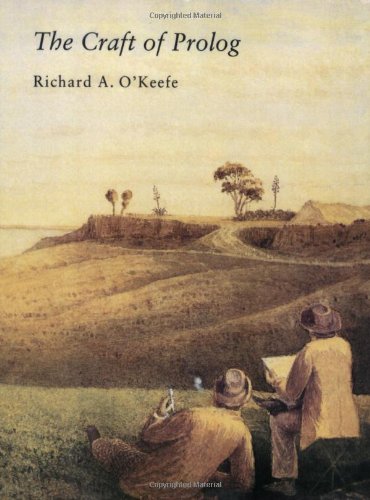The Craft of Prolog epub
Par baxter elizabeth le dimanche, mai 7 2017, 02:24 - Lien permanent
The Craft of Prolog. Richard O'Keefe

The.Craft.of.Prolog.pdf
ISBN: 0262150395,9780262150392 | 412 pages | 11 Mb

The Craft of Prolog Richard O'Keefe
Publisher: MIT
Two years ago, we were intimate, but time has eroded our bonds, and she is but a shadow flitting through dark synaptical corridors. One of the crucial 'values' of the book is that "Elegance in Not Optional". Concurrent logic programming has made this easier. I have an old book (1994) on Prolog called The Craft of Prolog written by Richard A. The Craft of Prolog (Logic Programming) [Paperback] REVIEW. The art of Prolog ( amazon); The craft of Prolog (amazon); A prolog in haskell (http://propella.blogspot.com/2009/04/prolog-in-haskell.html), and the referenced previous implementation http://darcs.haskell.org/hugs98/demos/prolog/. Asin 0262512270 The Craft of Prolog (Logic Programming) - The MIT Press - ecs4.com 94f61dd10aa97de11ede48e3d3c1cb45. O'Keefe's The Craft of Prolog, of course I kept comparisons to Tcl in mind. Richard Suchenwirth 2000-12-04 -- Job requirements have reawakened my interest in Prolog, while I still love, and work with, Tcl. >his classic, The Craft of Prolog? Does anyone have any Prolog book recommendations? O'Keefe's “The Craft of Prolog”. For example, see Richard O'Keefe's book The Craft of Prolog or Sterling and Shapiro's The Art of Prolog. For a more programmer-oriented book on Prolog, I highly recommend Richard A. There are nice discussions of both laziness and continuation passing style in the AI programming textbooks: O'Keefe's Craft of Prolog, and Norvig's AI Programming in Lisp. Concurrent logic programming has no search. > > The Art of Prolog from Shapiro etc, was really useful for me. > > >I'm a huge fan, and since the book is out-of-print according to the > >original publishers (MIT), it seems conceivable such an arrangement > >might have been made. This post was just the tip of the iceberg. For a good discussion of meta-interpreters in Prolog the reader should turn to The Craft of Prolog by Richard O'Keefe. On my walk home today I felt an irresistible urge to recall Prolog. He doesn't focus on the academic approach, but beautifully shows how to write clear, efficient, elegant code in Prolog.